Are you considering seeking an online consultation with a doctor? As you may have noticed, online medical consultations (e-consultation) are a rage currently. If you are wondering if you too should be part of the bandwagon, then let us tell you, you won’t regret this decision.
It might seem new and daunting, but e-consultation comes with some unique benefits. Once you have grasped the simple technological know-how, you will find yourself always wanting to opt for it. This is especially handy during the current COVID-19 pandemic.
Even though the lockdown has been called off, we have still been urged to step out only if necessary. If we go out, we risk exposure to the virus. Medical consultations are a priority. But what if that too can be done from the safety of your home?
E-consultation keeps both the doctors and the patients protected from COVID-19. Even if the doctor or the patient is COVID-19 positive and doesn’t know it yet, there will be no possibility of them passing it on to other people in the clinic.
And besides, if you think you are showing the symptoms of COVID-19, you can simply seek an online consultation without having to come out of your self-imposed isolation.
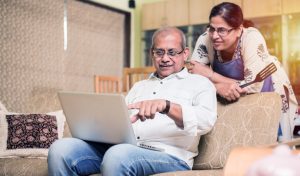
Although there are more pros than cons for online consultation, no physical exanimation and missed diagnoses or wrong diagnoses are some of the biggest challenges with online consultation as the physician is not able to examine the patient carefully.
Dr. Ashish Bajaj, M.B.B.S., M.D. in Clinical Pharmacology and Toxicology
Remember how tedious it is to wait for your turn? If you are feeling really unwell, being seated in the waiting room can make you feel even sicker. Waiting is also difficult for children and the elderly. But online consultation does away with the discomfort of traveling when sick, filling out forms, and the endless wait at the reception.
All you have to do is book a consultation on your computer. You can do that when you are feeling better or get someone to do that for you. When your slot arrives, you will simply log in and start interacting with your doctor.
Slotting in a visit to the doctor in your schedule can be a nightmare given how busy we are. Whether it’s for yourself or someone in your family, commuting to and from the clinic can take away a large chunk of your day. And being the busybodies that we are, it’s almost impossible to carve out time for anything but work and a bit of relaxation.
Besides, we are tired after a long hard day at work. It is so much hassle-free to simply opt for online consultation from the comfort of your home. You just have to be available for the time slot allotted to you.
Online medical consultation is cost-effective in two ways.
Firstly, many medical platforms such as PharmEasy offer free-of-cost doctor consultations through programmes like PharmEasy Plus. So you get sound and helpful medical advice from the best doctors without having to pay exorbitant fees like you have to for traditional consultation.
No matter where you live, how far away you are from the cities where these doctors practice medicine, you can still consult with them regardless of your location.
Secondly, you can save the money that would otherwise have gone into paying for your commute to the doctor’s clinic.
If your consultation is at the Out-Patient Department of a hospital or a clinic, things can get a little awkward especially, if you need to talk about sexual health problems. These places don’t always offer complete privacy.
But online medical consultations provide absolute privacy. It’s only you and your doctor here.

To make the most of online medical consultations, follow these tips –
Online medical consultation is suitable for our 21st-century lives. Technology aims to make our lives more convenient. So why not embrace online consultations? They are the future and the perfect tool to make medical consultations simple and convenient too!
Disclaimer: The information provided here is for educational/awareness purposes only and is not intended to be a substitute for medical treatment by a healthcare professional and should not be relied upon to diagnose or treat any medical condition. The reader should consult a registered medical practitioner to determine the appropriateness of the information and before consuming any medication. PharmEasy does not provide any guarantee or warranty (express or implied) regarding the accuracy, adequacy, completeness, legality, reliability or usefulness of the information; and disclaims any liability arising thereof.
Links and product recommendations in the information provided here are advertisements of third-party products available on the website. PharmEasy does not make any representation on the accuracy or suitability of such products/services. Advertisements do not influence the editorial decisions or content. The information in this blog is subject to change without notice. The authors and administrators reserve the right to modify, add, or remove content without notification. It is your responsibility to review this disclaimer regularly for any changes.
By now we all know how dangerous coronavirus is. It is still sweeping across the globe with no signs of slowing down. We have all pinned our hopes on the invention of preventive vaccines as well as drugs that can kill this dreaded virus.
But until that happens, we will have to continue with social distancing and self-isolation. The whole country had been home-quarantined for more than 3 months. Even though the lockdown has been lifted, people continue to work from home wherever possible and only step out to purchase essentials.
This could have an unpleasant side-effect – a deficiency of Vitamin D!
So why is self-isolation likely to trigger a deficiency of Vitamin D in your body? It’s simple. You are staying home almost all the time and hardly going out during the day. While this is an absolute requirement, it is also depriving you of exposure to sunlight. Most of the Vitamin D that we need is synthesized in our skin on sun exposure.
Sunlight is our chief source of Vitamin D. This particular nutrient is extremely vital for the health of our bones and teeth.
You see, your body needs Vitamin D to process calcium – the nutrient that strengthens your bone tissues. Vitamin D increases the absorption of calcium in the intestines. Research has shown that vitamin D deficiency is also associated with increased risk of diabetes, infectious diseases, autoimmune diseases, and even cancers.
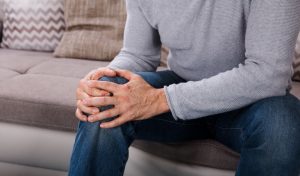
First of all, you need to know for certain if the Vitamin D level in your body is low. There are diagnostic tests that can determine your blood Vitamin D content. Get tested right away, before bone problems set in. Take the Vitamin D3 test at PharmEasy to determine your Vitamin D levels in the blood. The result of this test will tell you if your body needs more Vitamin D. If the number revealed by the test is too low, then you will have to take a rightful action.

Since it is not possible for us to increase our sun exposure because of the threat that going out poses, there is an alternative.
Take LivEasy Wellness Calcium, Magnesium, Vitamin D3 & Zinc Capsules to get the required amount of Vitamin D. Moreover, they also supply your body with calcium, magnesium and zinc – essential nutrients required by a healthy body.
To get an optimal vitamin D supplement from the sun at minimal risk of getting cutaneous malignant melanoma (CMM), a form of skin cancer, the best time for sun exposure is noon.
Dr. Ashish, M.B.B.S., M.D. in Clinical Pharmacology and Toxicology
Because health supplements are an excellent way to replenish any nutrient that is missing in your body. These tablets are completely safe and made from tested ingredients.
Calcium, as we said, strengthens your bones and teeth. Vitamin D will help your body utilize the calcium and prevent a number of bone and teeth problems. To amplify the effect of Vitamin D, these tablets also contain Magnesium and Zinc. Magnesium prevents bone inflammation and pain. Zinc helps to create the matrix on which new bone cells can form.

Consume LivEasy Wellness Calcium, Magnesium, Vitamin D3 & Zinc Capsules every day as these will not only provide your body with the Vitamin D that you are sorely missing now but also complementary nutrients, all of which will act together to keep your bones and teeth tough and resilient.
So while you are staying safe by staying indoors, take LivEasy Wellness Calcium, Magnesium, Vitamin D3 & Zinc Capsules to ensure your body receives the nourishment it needs.
Our skin’s ability to produce vitamin D drops with age. If you’re over age 65, you generate only one-fourth as much vitamin D as you did in your 20s, supplementation is often recommended at this age.
Dr. Ashish, M.B.B.S., M.D. in Clinical Pharmacology and Toxicology
Disclaimer: The information provided here is for educational/awareness purposes only and is not intended to be a substitute for medical treatment by a healthcare professional and should not be relied upon to diagnose or treat any medical condition. The reader should consult a registered medical practitioner to determine the appropriateness of the information and before consuming any medication. PharmEasy does not provide any guarantee or warranty (express or implied) regarding the accuracy, adequacy, completeness, legality, reliability or usefulness of the information; and disclaims any liability arising thereof.
Links and product recommendations in the information provided here are advertisements of third-party products available on the website. PharmEasy does not make any representation on the accuracy or suitability of such products/services. Advertisements do not influence the editorial decisions or content. The information in this blog is subject to change without notice. The authors and administrators reserve the right to modify, add, or remove content without notification. It is your responsibility to review this disclaimer regularly for any changes.
The world is still in the grip of the COVID-19 health crisis. A pandemic that had countries imposing emergency self-isolation or rigorous lockdown is not going to go away very soon.
Countries like New Zealand and Singapore that have always invested a large percentage of GDP in healthcare responded immediately with massive border restrictions, wide-scale testing, and contact tracing can today report a flattened curve with high recovery rates. But the picture looks grim for other countries.
The lockdown in India had to be lifted and travel restrictions eased to bolster a slumping economy. This has once again escalated transmission rates. At this moment, it is crucial for us to be familiar with all the symptoms of this disease so that we can take prompt action to protect ourselves.
Like with all diseases, only when you know the symptoms of an illness, will you be able to take the right action at the right time. COVID-19 virus has an incubation period of 12-14 days. This means, within 2 weeks of exposure, you might experience-

Skin changes like flat rash covered with small bumps, discolored areas on the fingers and toes. Severe confusion (delirium) might be the main or only symptom of COVID-19 in older people.
Dr. Ashish Bajaj – M.B.B.S, M.D.
There is no clear evidence that the virus has mutated to become more dangerous and produce newer symptoms in humans. That usually happens when a virus or bacteria needs to immunize itself against a vaccine or medicine. For coronavirus, there is no mutation so far.
However, there are some less common symptoms of coronavirus that not many people know of. Unless they do, they might not seek medical help. The symptoms are –
Preventive measures are still our best chances of halting the progress of the disease. We have to consciously adopt a few measures to keep our families and ourselves safe-
Masks are indispensable. Wear one whenever you go out, for shopping or work. Wash it when you come home. Make sure you always wear your own mask and it has to be dry.
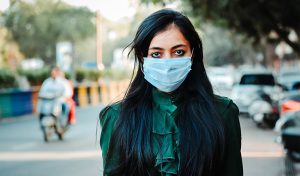
Wash your grocery and food packets under running water. Sanitize your phone. When you enter your home, wash your bag, shoes, clothes and give yourself a shower.
If you are going back to your office, sanitize your desk and equipment. Use alcohol-based sanitizer after touching elevator buttons, toilet flush, washroom door, office phone or photocopy machine, etc. Don’t go to work if you show signs of COVID-19.
While the initial symptoms remains same between the variants of covid an important study revealed that after effects of covid are linked to some variants ie. neurological symptoms like brain fog, persistent headaches and fatigue were linked with patients infected during the alpha and delta variants.
Dr. M.G. Kartheeka, MBBS, MD
Do not eat at your office cafeteria. Bring your own lunch and have it at your desk.

No matter whom you meet, an old friend or a close family member, do not hug them. Do not shake hands.
If you are travelling by bus, airline or train, undergo thermal screening. If you are visiting malls or doctors’ clinics, allow the personnel to disinfect you.
COVID-19 is here to stay for the time being. However, with the active cooperation of every citizen, we can slow it down until there is light at the end of the tunnel in the form of a vaccine. Till then, follow precautions strictly to stay safe!
The world had realized long ago that the only way to bring back normalcy to our lives & to the global economy is through vanquishing COVID-19. And the world-wide push to discover medication for this viral infection is going on full throttle.
As of now, pharmaceutical companies are still trying to come up with a proven and approved drug to treat COVID-19. With the case count in India shooting up daily and the pandemic showing no sign of slowing down, Indian pharmaceuticals too have been racing against time to contain the damage. With more than 4.4 lakh people testing positive, the situation is starting to look grim. But there is a ray of light!
The name of a medicine Favipiravir has been doing the rounds over the last few days. What is it and why has it got the scientific community buzzing?
Glenmark Pharmaceuticals, which has been foremost in the research for a COVID-19 drug has recently launched an anti-viral medicine Favipiravir, that is found to yield promising results. Glenmark Pharmaceuticals invented the active ingredient, API for this drug through its in-house research team. It announced in a press release that it had earned the DCGI’s approval to manufacture and market the drug under the brand name FabiFlu. It believes that in the grimly escalating situation that prevails in India, an orally administered drug will be more helpful.

Note that FabiFlu is not an established cure for COVID-19 as of today, clinical trials and research are still ongoing to come to a conclusion about the efficacy, the safety of the medicine. The clinical trials and reports published by Glenmark state that this new medicine has shown potential in treating mild to moderate cases of coronavirus.
What is the current status of FabiFlu?
For a medicine to be approved in India, it needs to go through robust clinical research in animals, followed by humans. The same data is then submitted to the government. In the case of FabiFlu, the clinical trials that establish safety and efficacy are still being conducted. As there is currently no established cure for COVID-19 and the number of cases rising, the government has approved Glenmark to conduct phase 3 trials and meanwhile manufacture and market the medicine.

This medicine’s safety is still being established in large clinical trials (phase 3). Hence its use is going to be very restricted and controlled for now. It will be prescription medicine only. Dosage shall be as prescribed by a registered medical practitioner based on the patient’s medical history and condition.
This medicine is only for emergency restricted use. It means before taking this medicine, each patient will be explained in detail the benefits and risks, the patient will be made to understand the safety, precautions and only when the patient is convinced, he will have to sign an Informed consent form. The same shall also be signed by the doctor as well. Once this is done, only then the patient shall receive FabiFlu. This should never be self-medicated as there are several safety concerns, precautions you need to follow even when taking this medicine and even a few days after discontinuing the treatment. Only when the same has been explained to you by your treating doctor, should this be taken.
Each tablet will be priced at INR 103.
The development of a new drug at a time of this immense crisis seems to offer us hope in the fight against COVID-19.
Disclaimer: The information provided herein is accurate, updated, and complete as per the best practices of the Company. Please note that this information shall not be treated as a substitute for physical medical consultation or advice of a registered medical practitioner. We do not guarantee the accuracy and completeness of the information so provided. The absence of any information and/or warning to any drug shall not be considered and assumed as an implied assurance of the Company. We do not take any responsibility for the consequences arising out of the aforementioned information and strongly recommend you for a physical consultation from a registered medical practitioner in case of any queries or doubts. Please click here for detailed T&C
Pregnancy is a special time full of delight and expectations. But being pregnant can also be stressful. Understandably, you may be worried about the impact of coronavirus disease (COVID-19) on your as well as your baby’s health.
Research is currently being undertaken to evaluate the impacts of COVID-19 infection on pregnant women. Data are limited, as per the ICMR (Indian Council for Medical Research) at present, there is no evidence of scientific literature to suggest that pregnant women are at higher risk of developing a serious illness as compared to the general population.
However, pregnancy itself alters the body’s immune system. Pregnant women can be badly affected by certain respiratory infections, including COVID-19. Hence, pregnant women must take precautions to protect themselves and inform their doctor if they develop any symptoms such as fever, cough or difficulty in breathing.
If you have or think you have COVID-19, you must isolate yourself at home. Mothers can still hold baby skin-to-skin and stay in the same room as them but should wash hands and wear a mask, especially when bonding and breastfeeding.
Dr. M.G. Kartheeka, MBBS, MD(Pediatrics)
If you are pregnant, you should take the same precautions to avoid COVID-19 infection as other people. You can help protect yourself with these steps:

Pregnant and postpartum women have a higher risk for more severe illness from COVID-19 than non pregnant women.
Dr. Ashish Bajaj, M.B.B.S., M.D. in Clinical Pharmacology and Toxicology
Emerging evidence now suggests that passage of COVID-19 from mother to baby is probable, although the proportion of pregnancies affected and the significance to the neonate has yet to be determined. At present, there are no recorded cases of breastmilk or secretions from the vagina that have been tested positive for COVID-19. There is currently no scientific evidence suggesting an increased risk of miscarriage or early pregnancy loss concerning COVID-19. (ICMR, Guidance document, dated 12 April 2020).
Stay healthy by getting a COVID-19 vaccine, following guidelines from your doctor, and keeping your prenatal and postpartum care visits, as there is an increased risk of pre-term birth.
Dr. Ashish Bajaj, M.B.B.S., M.D. in Clinical Pharmacology and Toxicology
Prenatal visits are important to ensure maternal and fetal health. However, given the current global pandemic, we are facing, many obstetricians are either increasing the interval between visits or encouraging telehealth visits.
As per ICMR guidance, pregnant women are advised to attend routine prenatal checkups at 12, 20, 28 and 36 weeks of gestation, unless they meet current self-isolation criteria. For women who have had symptoms of COVID-19, appointments can be postponed until 7 days after the start of symptoms, unless they become severe.
For women who are self-quarantined because someone in their household has possible symptoms of COVID-19, appointments should be deferred for 14 days.
If you are concerned about attending your appointment due to COVID-19, talk to your doctor. Establish a trusting relationship with your doctor and freely ask them any doubts or concerns you may have regarding your pregnancy and delivery.

An important thing to do once your baby is born is to discourage visitors. Also, ensure that all those who are caring for the baby (you and your family) frequently wash hands and wear face masks.
You can safely touch, hold and breastfeed your baby since transmission of the virus through breast milk has not been reported to date (limited scientific data available suggest this is not likely to be a source of transmission). Wear a medical mask when you are in any contact with the baby, even while feeding. Mothers should also follow other measures of preventing infections, such as washing hands, sneezing or coughing in a tissue, wiping down surfaces, etc.
In case of temporary separation of the newborn from a mother with suspected or confirmed COVID-19 (to reduce the risk of spreading the virus to the newborn) following precautions should be taken.

Pandemics can be stressful for everyone. Fear and anxiety about a disease can be overwhelming for both adults and children. Depression during and after pregnancy is common and can be treated. Postpartum depression is the depression that can happen after having a baby. If you think you may be experiencing depression, seek treatment from your doctor as soon as possible.
As the saying goes, it helps to be prepared, not scared. Simple steps like regular hand washing and avoiding crowds can go a long way in protecting you and your baby. Do not stress if your due date is coming close. Hospitals have systems in place to ensure safe deliveries and reduce the risk of infection to newborns. Stay healthy and stay protected.
Disclaimer: The information provided here is for educational/awareness purposes only and is not intended to be a substitute for medical treatment by a healthcare professional and should not be relied upon to diagnose or treat any medical condition. The reader should consult a registered medical practitioner to determine the appropriateness of the information and before consuming any medication. PharmEasy does not provide any guarantee or warranty (express or implied) regarding the accuracy, adequacy, completeness, legality, reliability or usefulness of the information; and disclaims any liability arising thereof.
Links and product recommendations in the information provided here are advertisements of third-party products available on the website. PharmEasy does not make any representation on the accuracy or suitability of such products/services. Advertisements do not influence the editorial decisions or content. The information in this blog is subject to change without notice. The authors and administrators reserve the right to modify, add, or remove content without notification. It is your responsibility to review this disclaimer regularly for any changes.
International Yoga Day is finally here! Should 21st June be just another day on the calendar for you? Or will you let this be the day when you make a decision that will protect you from the pandemic?
A strong immune system can protect you from COVID-19 and other illnesses. There is no better way to boost your immunity than with yoga. Yoga prevents autonomic changes that impair your cellular immunity. By curbing stress and inflammation, it empowers your immunity.
If you don’t practice yoga, it’s never too late. Take that step today to have an alert mind and a healthy body! Are you wondering which yoga postures, in particular, will help your immune system? We have made a shortlist for you-
Yoga will seem hard at the beginning if you are new to it. But with just a few days of dedicated practice, your body will become more flexible.
It is an easy yoga pose and terrific for suppressing stress. Lie down flat on your tummy and extend your arms forward. Lift your neck slowly, all the while relaxing your glutes. Hold the pose and breathe in and out slowly for as long as you are comfortable.
This pose gets your life energy flowing through your body and that preps you for the challenges of the day ahead.
Trikonasana also begins with the tadasana. Now exhale and widen the gap between your legs until they are 3 ½ or 4 feet apart. Raise your arm along your sides and make sure that they are parallel to the ground. Now bend your upper body to the left. Bend from the waist. Grip your left ankle with your left hand. The right arm should be pointed towards the ceiling and perpendicular to the ground.
This pose improves your lung capacity and protects them from respiratory illnesses like the current pandemic.
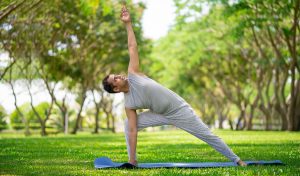
Stand in the mountain pose or tadasana (standing pose), inhale and lift your arms. Exhale and bend your knees. Push your hips back and bend your upper body forward. Now twist your body. One arm will face the ceiling and the other arm will support you with the palm placed flat against the floor next to your feet.
This posture not only increases your flexibility but is good for your gut bacteria that strengthen immunity. It increases the production of digestive enzymes and detoxifies your body.
This looks like a simple exercise, but executing it perfectly can take some getting used to. All you need to do is stand straight, raise your arms and make sure they are parallel to your ears. Now start bending back as far as you can go.
This posture stretches out your backbone, shoulders and neck muscles and is tremendously good for your heart. It ensures that more blood is pumped to all parts of your body. This translates to a greater oxygen supply to each cell, which makes them immune to diseases and oxidative stress.
This is a balancing act. It rights your body’s equilibrium, keeps the body grounded and enhances blood circulation by releasing tension and knots in your muscles. Your life force flows uninterrupted and toughens up your immunity.
Start with tadasana. Standing on your right foot, cross your left thigh over the right. Now point your left foot down and hook it around your right shin. Stretch out your arms in front of you and parallel to the ground. Cross your arms (right arm over the left) and bend the elbows. Then raise both forearms (they should be perpendicular to the ground). Ensure that the backs of the palms are touching each other.
Now turn the right hand to the right and the left hand to the left so that the palms face each other. Make sure that your right thumb passes in front of your left little finger. Stretch your fingers towards the ceiling. Stay in this pose for 30 seconds, unwind and continue with the legs and arms reversed.
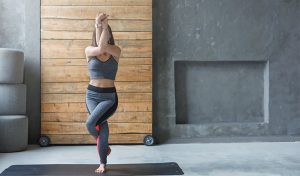
Stress and anxiety lower your body’s defences. Meditation is complementary to yoga and together the two can beat stress to strengthen your immunity.
Yoga is an inexpensive path to wellness and health. So make it a part of your life to enhance your wellbeing.
Disclaimer: The information provided here is for educational/awareness purposes only and is not intended to be a substitute for medical treatment by a healthcare professional and should not be relied upon to diagnose or treat any medical condition. The reader should consult a registered medical practitioner to determine the appropriateness of the information and before consuming any medication. PharmEasy does not provide any guarantee or warranty (express or implied) regarding the accuracy, adequacy, completeness, legality, reliability or usefulness of the information; and disclaims any liability arising thereof.
Links and product recommendations in the information provided here are advertisements of third-party products available on the website. PharmEasy does not make any representation on the accuracy or suitability of such products/services. Advertisements do not influence the editorial decisions or content. The information in this blog is subject to change without notice. The authors and administrators reserve the right to modify, add, or remove content without notification. It is your responsibility to review this disclaimer regularly for any changes.
Workplaces across India have started resuming operations. Many of us have already resumed our old routine of heading to our office in the morning. Very soon, all the working professionals will be back in their respective workplaces. While it is good news because our slumping economy will pick up the pace, it is quite natural that all of us will be apprehensive about contracting COVID-19.
The virus is still rampant and once we start coming in close contact with others, there will be a risk of us getting infected. But with proper precautions, you can keep COVID-19 at bay and keep yourself safe.
Even if the lockdown is lifted, it does not mean everything will be the way they were before the pandemic. We will still have to be extremely alert and zealously follow specific hygiene and safety guidelines to check the transmission of coronavirus.
Social distancing are the foundation of preventive measures. So, it is important to make sure that there are no gatherings in your office. This includes-
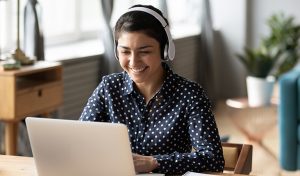
Be on high alert when it comes to hygiene. You will be touching objects on which the virus might exist such as lift buttons, fingerprint scanners, washroom door knobs, office phones, photocopy machines, etc. Every time your hands come in contact with these surfaces, you risk contracting COVID-19. So what should you do?
Sanitize your hands with an alcoholic hand sanitizer. These sanitizers can effectively kill the coronavirus. Use soap and water after using the washroom. Disinfect your hands after touching any object.
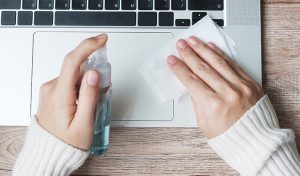
Your safety protocol does not end once you sign out from your office. Before you enter your home, there are a few things you must do-

Once you start going back to work, you must accept that there will be a risk of getting infected. That is why you have to be vigilant. If you notice any symptoms, then call the national helpline 1075 or your state helpline.
Do not go back to work until you are sure that it’s not coronavirus that you have contracted.
Unless we are all extra careful, there will be a spurt of COVID-19 cases once people get back to work. If you are going back to work, it is your responsibility to follow social distancing and hygiene regulations. We are all in this together. So take extra care of yourself to stay safe.

Disclaimer: The information provided here is for educational/awareness purposes only and is not intended to be a substitute for medical treatment by a healthcare professional and should not be relied upon to diagnose or treat any medical condition. The reader should consult a registered medical practitioner to determine the appropriateness of the information and before consuming any medication. PharmEasy does not provide any guarantee or warranty (express or implied) regarding the accuracy, adequacy, completeness, legality, reliability or usefulness of the information; and disclaims any liability arising thereof.
Links and product recommendations in the information provided here are advertisements of third-party products available on the website. PharmEasy does not make any representation on the accuracy or suitability of such products/services. Advertisements do not influence the editorial decisions or content. The information in this blog is subject to change without notice. The authors and administrators reserve the right to modify, add, or remove content without notification. It is your responsibility to review this disclaimer regularly for any changes.
Starting from June, lockdown regulations will be eased in most parts of the country except in places where COVID-19 is virulent. After nearly two and a half months of enforced self-isolation, India is slowly inching back to its pre-COVID-19 ways – workplaces are back in business and airlines, buses, cabs and auto-rickshaws are operational again.
But remember, lockdown is being lifted to prevent further damage to our economy and normalize workflow in the country, NOT because coronavirus has been vanquished. It is still at large and anyone can contract it anytime, including you.
We have to be responsible and for the sake of our compatriots as well as our families, we need to be mindful of a few things-
Accept it, rigorous personal hygiene will be an integral part of our routine from now on. The good news is hygiene not only prevents coronavirus but many other illnesses as well like the flu, diarrhoea, common cold, stomach infection, etc.
So don’t forget to disinfect your hands with soap and water or alcohol-based hand sanitizer frequently. You should do it after-

Other hygiene measures to keep in mind-
Social distancing continues to be as important as ever. At all times, try to maintain 6 feet of distance between you and others. So whether you are out to purchase groceries, taking the bus to your office or working alongside a bunch of people at your place of work, do not come near others.

We realize this would be difficult to implement, but buses (trains and metro when they start plying) are likely to be packed with people and any one of them could be infected. So instead, look for alternatives. If your office is fairly close, WALK! It might seem like a big ask, but it would also do your health a lot of favour. You could also rent bicycles or even purchase one and of course, you could take a motorbike or a car to work.
Another way to win the war against COVID-19 is by strengthening your immunity. The stronger it is, the fewer the chances of you contracting it and it is not even difficult. A few herbs, fruits, nuts and vegetable will do the trick such as-
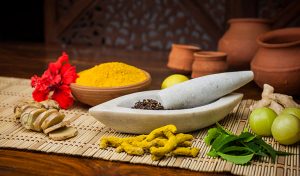
All of these foods are loaded with antioxidants and have powerful anti-microbial properties that eliminate pathogens, which enter your body.
Wearing masks was made mandatory when the lockdown was in force and you should continue with this safety measure. A double-layered mask offers vital defence against coronavirus.
Post lockdown, do not expect life to be just as it was before. You are still to avoid containment zones. Even if you have family or friends living in such a zone, do not visit them right now.
If you are travelling long distances by flight, train or bus, comply with the rules and do not opt-out of thermal screening.
Lockdown being lifted is not a reason to throw caution to the wind. You have to be even more alert now as the risk of transmission will rise exponentially.
Remember, don’t let your guard down to stay safe and healthy.
Disclaimer: The information provided here is for educational/awareness purposes only and is not intended to be a substitute for medical treatment by a healthcare professional and should not be relied upon to diagnose or treat any medical condition. The reader should consult a registered medical practitioner to determine the appropriateness of the information and before consuming any medication. PharmEasy does not provide any guarantee or warranty (express or implied) regarding the accuracy, adequacy, completeness, legality, reliability or usefulness of the information; and disclaims any liability arising thereof.
Links and product recommendations in the information provided here are advertisements of third-party products available on the website. PharmEasy does not make any representation on the accuracy or suitability of such products/services. Advertisements do not influence the editorial decisions or content. The information in this blog is subject to change without notice. The authors and administrators reserve the right to modify, add, or remove content without notification. It is your responsibility to review this disclaimer regularly for any changes.
The number of COVID-19 cases in India has already crossed the 1.8 lakh mark and continues to steadily rise each day. Staying indoors can help us prevent COVID-19 from spreading. It is also essential for us to maintain personal hygiene as well as hygiene at home to minimize our chances of getting sick.
Transmission of novel coronavirus occurs much more commonly through respiratory droplets than through objects. Current evidence suggests that COVID-19 may remain active for hours to days on different types of surfaces. Therefore, cleaning visibly dirty areas followed by disinfection is the best measure for the prevention of COVID-19 in day to day practice.
Cleaning is the process of removal of germs, dirt, and impurities from a variety of surfaces. It does not kill all germs, but removing them, lowers their numbers and the risk of spreading infection. Disinfection is the process of using chemicals (disinfectants) to kill germs present on different surfaces. If done correctly, it can kill harmful microorganisms. Dettol, Lizol, bleach, rubbing alcohol, sodium hypochlorite, etc. are the various types of disinfectants that are easily available.
According to CDC Disinfection to reduce transmission of COVID-19 at home is likely not needed unless someone in your home is sick or if someone who is positive for COVID-19 has been in your home within the last 24 hours. Clean high-touch surfaces such as doorknobs, tables, and light switches regularly.
Dr. M.G. Kartheeka, MBBS, MD
This is probably the most touched surface in the house. Right from the front door of your house to the handles on cupboard doors and rooms, it is vital to make it a habit to disinfect and wipe all the door handles in the house. Don’t forget to clean and disinfect the refrigerator door handle, table surfaces, metal/plastic/rubber baby toys, chairs and desk surfaces as well.
Think of your mobile phone as your third hand. We tend to check our phones at least 20-30 times a day, helping germs easily transfer from your hands to your mobile phone. Phones should preferably be cleaned with disinfecting wipes gently on exterior parts of phones in switched off mode. Avoid the use of bleach or the entry of moisture through any openings. Many mobile companies have provided recommendations on the cleaning of phones during this COVID-19 pandemic. Check your phone manufacturer website for instructions on what to use to clean your phone to avoid damage to the device.
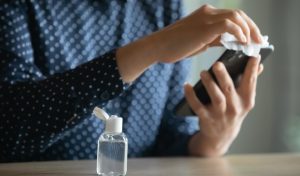
Surfaces must be cleaned with water and soap or a detergent first to remove dirt, followed by disinfection, if you do sanitize or disinfect, clean surfaces first because impurities like dirt may make it harder for sanitizing or disinfecting chemicals.
Dr. Ashish Bajaj – M.B.B.S, M.D.
While you might not be touching your face regularly, you still touch your spectacles very often. Wipe your spectacle frames with a disinfecting wipe or a cloth dampened with disinfectant liquid*. You can also use a sanitiser and a clean, lint-free towel to wipe the lenses.
Cleaning our laptops is more important than ever now that we are working from home. Use a disinfectant wipe or a soft, lint-free cloth and wipe on the top and sides of each key, preferably in a switched off mode. Also, clean the surface and bottom of the keyboard thoroughly. Entry of moisture or any disinfectant liquid through any openings must be avoided.

We all find ourselves watching quite a bit of TV during this lockdown. This means that your remotes need a good cleaning since it is being handled by everyone at home. Remember to clean and disinfect your remote gently with a disinfectant wipe or a cloth soaked in disinfectant liquid. Needless to say, the entry of moisture and disinfectant liquid inside the remote control must be avoided during cleaning.
Every packed grocery item should be wiped with soapy water or sanitiser (food packets, food bags, etc.) While purchasing groceries, make sure that you use cloth bags. Wash and disinfect them after every purchase.
Clean your fruits and vegetables under running water. You may soak them in a solution of salt or baking soda with water for some time. Rinse the items with clean water, dry and store them normally.
If you are visiting the grocery or vegetable store, it means that you are taking your purse/wallet out. Add your wallet to the list of things you need to sanitize after visiting a store. Use a small amount of hand sanitiser* applied to the surface of the purse with a tissue or a clean cloth. You can disinfect keys (without remote controls) and coins by soaking them in a soap solution of dishwashing liquid for a short amount of time. After this, rinse them with clean water and leave them in the sun to dry. As far as possible, try and use digital or card payments instead of cash. After handling/touching a card or cash for transaction/payment, always clean your hands with an alcohol-based hand sanitiser.
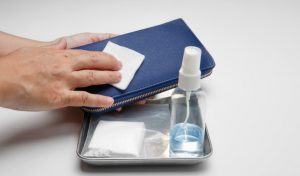
Nowadays, you are probably using your kitchen counter numerous times a day. Areas where food is stored or prepared have more microbial contamination than other places in the home.
Have you stopped to think about the number of times you switch on and off the lights and fans at home? Switches and doorbells can be cleaned with disinfectant wipes once every couple of days.
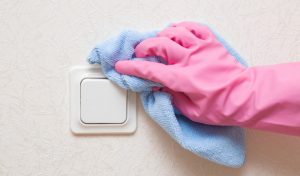
*Disinfectant wipes should have at least 60% ethanol or 70% isopropanol content while sanitisers should have at least 60% ethanol content.
It has become more important than ever to make sure that our houses stay virus-free and clean. Make sure you wash your hands regularly to minimize the spread of germs inside your house. Stay safe!
Disclaimer: The information provided here is for educational/awareness purposes only and is not intended to be a substitute for medical treatment by a healthcare professional and should not be relied upon to diagnose or treat any medical condition. The reader should consult a registered medical practitioner to determine the appropriateness of the information before consuming any medication. PharmEasy does not provide any guarantee or warranty (express or implied) regarding the accuracy, adequacy, completeness, legality, reliability, or usefulness of the information; and disclaims any liability arising thereof.
Links and product recommendations in the information provided here are advertisements of third-party products available on the website. PharmEasy does not make any representation of the accuracy or suitability of such products/services. Advertisements do not influence the editorial decisions or content. The information in this blog is subject to change without notice. The authors and administrators reserve the right to modify, add, or remove content without notification. It is your responsibility to review this disclaimer regularly for any changes.
After the long COVID-19 lockdown, India is slowly but surely returning to normalcy. Airlines have started staggered operation of flights. ‘Shramik’ express trains and buses are traversing the length and breadth of the country, returning migrant workers to their home states.
Travel restrictions will most likely be lifted in the near future and then we will be boarding trains and buses to go to work or visit our family. Alternatively, we could also be boarding a flight to return home or to the city where we work.
However, like everyone, you too must be worried about contracting COVID-19 once you start travelling by public transport. After all, you will be coming in contact with so many people and any one of them could be a carrier. And should you catch the disease, you could then pass it on to your family. So what should you do? Fortunately, there are a few precautions that can keep you safe when you travel.
First things first, preventing the further spread of the disease is everyone’s responsibility. So each of us needs to follow certain guidelines to keep everyone safe from the clutches of coronavirus. These guidelines are simple to implement
Social distancing is still the most effective way to prevent coronavirus. You may have heard that airlines, trains and buses have mandated that they will not be filled to full capacity and rows will be left vacant. And we have to be extra responsible and ensure that this social distancing is maintained throughout our commute.
What can you do? Form an orderly queue before boarding your flight, train or bus and make sure there is sufficient distance between you and the other passengers. Do not crowd around the exits when it is time to disembark. In a train or bus, do not forcefully occupy seats that are left empty for the sake of social distancing.
Use of jala neti kriya with salt water post travelling is effective in reducing the covid viral load inside nasopharyngeal cavity as salt water is inhibitory to growth of virus.
Dr. M.G. Kartheeka, MBBS, MD(Pediatrics)
At all times, be at least 6 feet away from everyone.

Another crucial preventive measure is to sanitize your hands multiple times while commuting. You will be touching handrails, overhead baggage compartments and washroom doorknobs. As we know, coronavirus can linger on these surfaces for 72 hours. Using an alcohol-based sanitiser will kill the virus if it is present on your hands.
Avoid eating while travelling back and forth from work. If it is a long interstate journey, make sure your hands are washed or sanitized thoroughly before consuming food. Do not touch your face, eyes, nose or mouth with your hands unnecessarily. Make sure your children don’t do that either.
Sanitize your hands again after you get off your flight, train or bus. According to guidelines issued by the Ministry of Health and Family Welfare, all airports, railway stations and bus terminals will be stocked with soaps and sanitisers so use them. Once you reach your office or home, clean your hands with soap and water for a minute.
Wear a protective mask at all times, from the moment you step out to when you reach home. It offers the first line of defence against transmission.
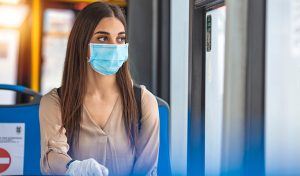
To eliminate the risk of the coronavirus surviving on your clothes, suitcase or work bag, you need to disinfect them when you come home after your journey by flight, train or bus. Wash your clothes and suitcase or bags.
The centre has requested states to make arrangements for thermal screening at airports, railway stations and bus terminals. Please undergo the screening. It is for your own good and the safety of our country.
If you are exhibiting any sign of coronavirus, refrain from travelling altogether as you will risk the health of others.
According to guidelines, all flight or ‘Shramik’ express passengers are to self-monitor for 14 days. If you think you have symptoms of coronavirus, consult a medical professional immediately.
It is natural to be apprehensive about opting for public modes of transport in the present scenario. But life cannot remain on hold forever. Follow basic hygiene guidelines while travelling and cooperate with the transport authorities. If we are all cautious, together we can defeat the COVID-19 menace.
Disclaimer: The information provided here is for educational/awareness purposes only and is not intended to be a substitute for medical treatment by a healthcare professional and should not be relied upon to diagnose or treat any medical condition. The reader should consult a registered medical practitioner to determine the appropriateness of the information and before consuming any medication. PharmEasy does not provide any guarantee or warranty (express or implied) regarding the accuracy, adequacy, completeness, legality, reliability or usefulness of the information; and disclaims any liability arising thereof.
Links and product recommendations in the information provided here are advertisements of third-party products available on the website. PharmEasy does not make any representation on the accuracy or suitability of such products/services. Advertisements do not influence the editorial decisions or content. The information in this blog is subject to change without notice. The authors and administrators reserve the right to modify, add, or remove content without notification. It is your responsibility to review this disclaimer regularly for any changes.
Next Page »« Previous Page